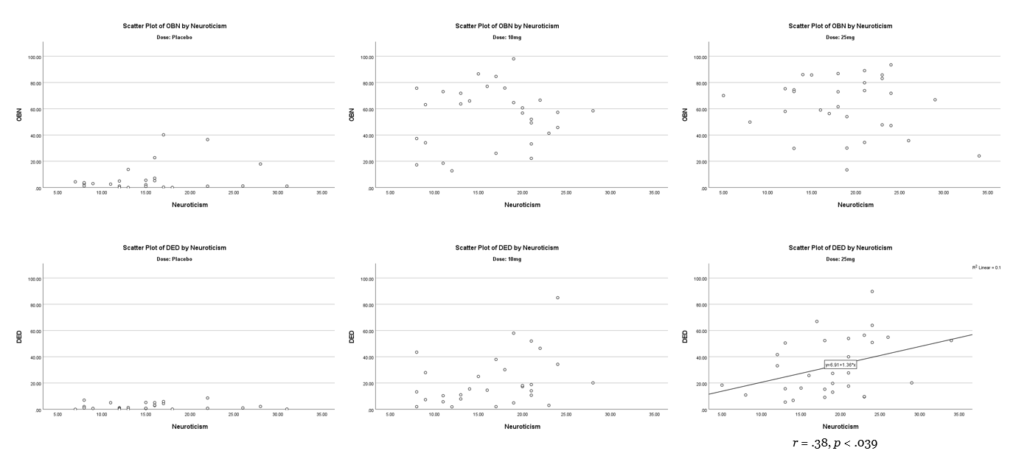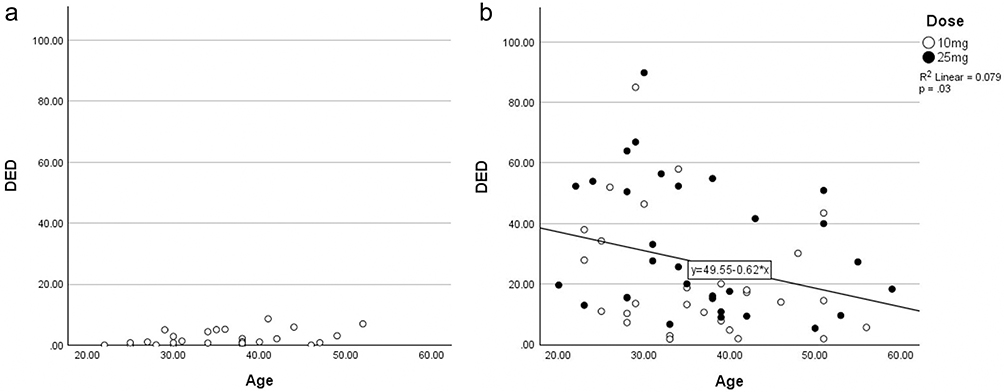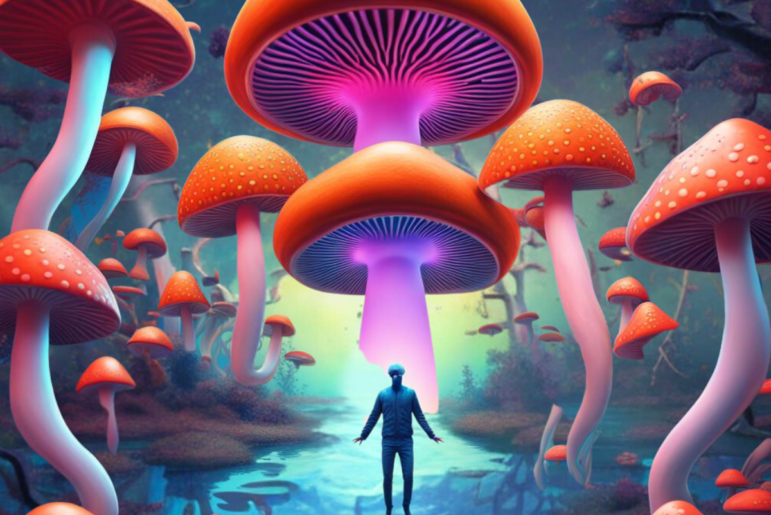Anxiety is one of the most common mental disorders, affecting 4.05% of the global population. While many psychedelic users turn to these substances hoping to alleviate their symptoms, they can sometimes get blindsided by intense anxiety during their trip, which can make the experience unpleasant.
However, this feeling is temporary, and psilocybin has the potential to produce long-lasting improvements to anxiety symptoms. We’ll provide the data to back up these claims and offer strategies to avoid anxiety during your psilocybin mushroom trip which are also applicable for other psychedelics, such as LSD, DMT and ibogaine.
Why Some People Feel Anxious When Taking Shrooms, According to Research
There are several reasons why some people may feel anxiety when dosing psilocybin mushrooms.
Anxiety related factors include:
- Changes in glutamate levels
- Neurotic personality traits
- Age
Changes in Glutamate Levels
Neuroscientist Natasha Mason et al. conducted a study to discover what happens in the brain during psychedelic trips, hoping to pinpoint why some people have peaceful experiences on psychedelics while others are flooded with anxiety.
The researchers found that psilocybin produces changes in glutamate levels in different brain regions, determining what the experience will be like.
They linked higher levels of glutamate in the medial prefrontal cortex with anxious ego dissolution, a.k.a bad trips, and lower levels of glutamate in the hippocampus with positive ego dissolution.
Ego dissolution occurs when decoupling between the default mode network and the medial temporal lobe prevents you from accessing your autobiographical information. Without access to this data, your identity dissolves, and you can experience unity and oneness or become anxious.
Anxious ego dissolution can trigger paranoia or excessive vigilance towards your surroundings and lead to generalized anxiety. However, the researchers observed the paradoxical nature of these effects, as psychedelics can also offer long-term relief from anxiety.
They also found that this increased glutamate activity enhances neuroplasticity, and we’ll explore this phenomenon’s impact on your well-being further in the article.
Neurotic Personality Traits
Researchers at King’s College London‘s Institute of Psychiatry, Psychology & Neuroscience found that neuroticism plays a role in predicting whether people’s psilocybin experience will be positive (mystical) or challenging. According to the study results, individuals with higher levels of neuroticism report having more intense and challenging psychedelic experiences because people with high levels of this personality traits experience negative emotions more often.

Negative emotions include:
- Anger
- Irritability
- Anxiety
- Depression
This finding is consistent with other research and suggests that an individual’s tendency toward emotional instability may predispose them to the more challenging aspects of a psychedelic encounter.
Age Is a Predictor For the Intensity of the Psychedelic Experience
The same study from King’s College London also found that age is negatively correlated with the intensity of a challenging psilocybin experience, suggesting that older individuals have more pleasant and less anxiety inducing experiences than younger people.

The researchers suggested that, “This likely reflects the influence of psychological or biological factors associated with increasing age, such as the development of better coping skills for negative or challenging experience, rather than age itself.”
Identifying Anxiety Triggers During a Psilocybin Trip
Most anxiety triggers during a mushroom trip can be prevented, so preparing yourself for the trip is crucial.
Some anxiety triggers include:
- Mindset
- Environment
- People
- Dose
Timothy Leary introduced the concept of set and setting in 1964 in his book The Psychedelic Experience: A Manual Based on the Tibetan Book of the Dead. It refers to the internal and external factors that influence your psychedelic experience.
Set
Your set is the mental state you bring to the experience, which can define how it will go before it even begins. You should be calm, centered, and open to wherever the mushrooms will bring you. You should also reschedule the psilocybin experience if you’re going through personal issues or fear what you may encounter throughout your psychedelic experience.
Tips to prepare your set:
- Reflect on your intentions for the trip
- Practice yoga, meditation or both
- Educate yourself about what to expect from a psychedelic experience
Setting
Your setting is the environment you’ll be around throughout your journey. It should be a place that makes you feel and safe. Most experienced psychonauts prefer tripping in nature. Connection to nature provides additional cognitive benefits according to correlational and experimental research. Hence, being around trees, earth and water provides additional healing and releases anxiety. As long as you enjoy spending time in that place, it can be anywhere, as long as you’re confident you’ll want to remain there once your trip begins.
Stressful situations such as deadlines, medical procedures, or plane travel can make you anxious even if you’re sober, so you should choose a day free of responsibilities.
People
Another component of your setting is the people surrounding you during your mushroom trip. Ideally, you should have a trip sitter or a psychedelic facilitator who is experienced with psychedelics and who can comfort you if you begin feeling anxiety during your come-up. Your trip sitter should be someone you trust and are comfortable being vulnerable with. Their job is to hold space for your experience without disrupting it, and to only provide guidance when you ask for support on when they deem it necessary. At the very least, avoid tripping with strangers or by yourself.
If you’re tripping solo and none of your friends or family can help you de-escalate the situation, consider calling the fireside project helpline at 623-473-7433. This helpline was created to help people talk through their psychedelic experiences and integrate any insights they gained into their lives.
You may also like: If Your Psychedelic Experience Isn’t Going According to Plan, Call a Psychedelic Helpline | Psychedelic Spotlight
Experiencing the After effects of a Bad Trip

The upside to these sometimes harrowing psychedelic experiences is that psychaunts report getting psychological or existential insights. While it isn’t always the case, some users can find silver linings in their bad trips.
According to a 2022 paper published in the Journal of Psychopharmacology, insights from psychedelic experiences include:
- “Revealing deep insightful, accurate, poignant relief.”
- “Coming up with good insights to questions that I had in my mind at that moment.”
- “Having insights into my failure to love; that I had not reciprocated the near unconditional love from my sister. I felt an overwhelming sense of shame. I will henceforth love her unconditionally.”
- “Mourning for the life I lived, thankful for the insight, for this ray of light in a pitch-black universe.”
- “Meta-aware, insight, humility, group mind, save humanity.”
- “Realisation. Understanding. Insight.”
- “Later in the trip I was able to let go even more and speaking to one of the facilitators I was able to express an insight about the earliest years of my life.”
A study surveying 985 participants who had used psychedelics found that intense mystical, psychological, or challenging experiences resulted in a profound improvement of their mental health.
More information on the topic: New Research Shows “Bad Trips” Can Be Beneficial to Mental Health
After confronting their darkest thoughts or realizing they are in a delicate mental state, users feel motivated to change poor habits or environmental factors, and this circles back to psilocybin’s complex interactions with the brain.
Psilocybin’s activation of glutamate networks also increases the amount of a Brain-Derived Neurotrophic Factor (BDNF) molecule. This molecule keeps neurons healthy by strengthening their connections and encouraging neuron growth.
These changes to the brain’s structure enhance its neuroplasticity, which is its ability to reorganize and readapt to break free from established thought patterns. These entrenched thought patterns can cause anxiety or depression; eliminating them can improve your mental health.
Another way to reframe a negative experience with psychedelics into a positive one is to narrate it afterward, as it’s a way to make sense of bizarre or confusing thoughts and visuals you might have had. We’re sure you’ve heard or read bad trip stories from acquaintances or on the internet, and while some act as cautionary tales, they almost always contain profound insights or mark a turning point in the narrator’s life.
Read also: You Can Make ‘Bad Trips’ Good with Storytelling, Study Shows | Psychedelic Spotlight
Tips to Prevent Feeling Anxiety During a Mushroom Trip
1. Take a Rational Dose
Education and preparation is essential for novices. Without proper research or due to bad advice from psychedelic forums, you may take a dose that’s too high to manage, especially if you lack previous experience with these substances. According to research, high doses are predictors of the intensity of a psychedelic experience – whether positive of challenging. This is why it is often recommended to always start low and go slow to ensure that you’re not taken by surprise by the intensity of a trip that you are not prepared to manage. This could make you anxious and put you in a negative thought loop.
Learn more at: How Much Shrooms Should A Beginner Take?
2. Avoid Mixing Mushrooms With Other Substances
You should avoid combining psilocybin with other substances that could ruin your trip or pose a serious health risk. Combining psychedelics with pain relievers can result in dangerous side effects.
Read also: The Risks of Mixing Psychedelics and Opioids for Chronic Pain
Unless you enjoy marijuana’s effects and can handle intense trips, you should avoid it. Weed can intensify your psychedelic experience and prolong it. Some users report feeling “waves” of peak effects during the comedown after using cannabis, which is the last thing you’d want after a bad trip.
It can also induce paranoia and uncomfortable physical sensations like an increased heart rate, nausea, or body temperature fluctuations, which may contribute to anxiety.
3. Prepare Your Set & Setting Beforehand
As mentioned above, your set and setting are crucial players in your psychedelic experience. Plan where and when your trip will be in advance, make sure you’re surrounded by a trusted trip sitter, and avoid tripping on stressful days.
4. Pay Attention to Your Diet Before Your Trip
Consuming greasy and heavy meals before your psychedelic trip can greatly affect the quality of your experience and your general psychological state.
Avoid eating:
- High processed foods
- Greasy meals
Avoid drinking:
- Caffeine
- Alcohol
- Sugary drinks (processed sugar)
Eat instead:
- Light salads
- Soups
- Fruits
5. Take Vitamin and Minerals Supplements
Take supplements, such as:
- Vitamin D
- Magnesium
- Omega 3
Natural supplements can enhance the experience and reduce potential side effects such as anxiety and the comedown post-psychedelic experience.
Take Probiotics and Prebiotics
The relationship between the gut and the brain is critical for your daily life, and can connect anxiety with stomach issues and vice versa. Indigestion can lead to poor health and can prevent your body to absorb the necessary nutrients linked to improved serotonin levels.. To improve the health of your gut microbiome, you can supplement in your diet: prebiotics and probiotics.
To learn more about your diet should consist of before, during and after your psychedelic trip, visit our guide.
Try the Lemon Tek Method
Some users experience a rush of anxiety or nausea during the come-up, which can predispose them to a bad trip, especially if these feelings remain once the effects kick in. Because of this, many psychonauts suggest trying the “lemon-tek” method of ingestion.
Lemon tekking consists of finely grinding or chopping your mushrooms and soaking them in lemon juice for around 30 minutes. The lemon juice converts the prodrug psilocybin into psilocin, which is the compound that provides the psychedelic effect, giving your digestive system a head start.
You’ll experience a shorter come-up and fewer side effects, although your trip may be shorter and more intense.
For a more in-depth guide: How To Make Lemon Tek for a More Potent Magic Mushroom Experience | Psychedelic Spotlight
Try to Let Go
No matter how much you prepare for it, intense trips can happen anyway. What separates a beginner from an expert psychonaut is having the ability to let go of your fears and accept the experience for what it is.
No trip lasts forever, and observing the thoughts and feelings it produces can lead to great insights and changes in your life. If you struggle to control or fight these stimuli, you could make it worse for yourself by falling deeper into the rabbit hole.
